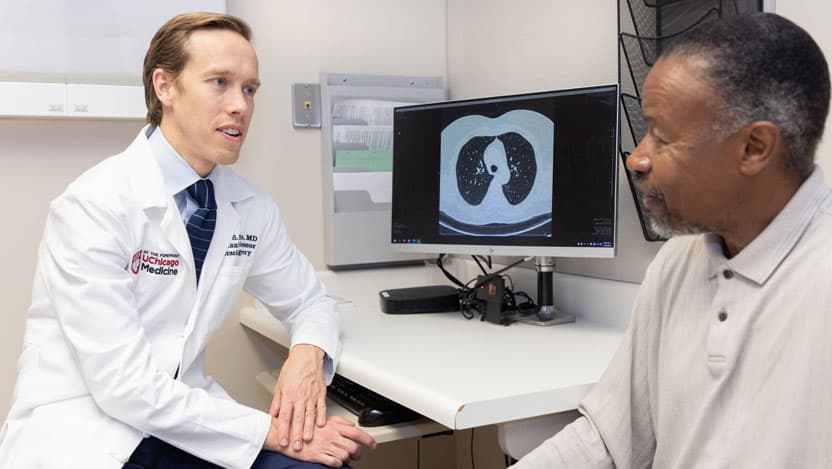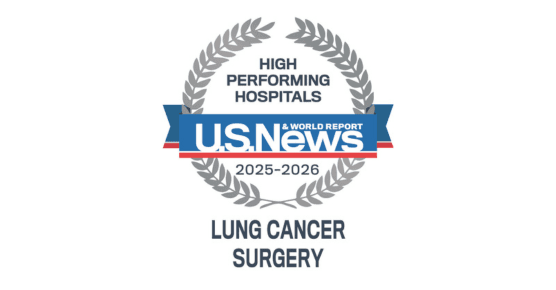Lung Cancer Surgery


High Performing in Lung Cancer Surgery
According to U.S. News & World Report's 2025-26 Rankings.
Learn more about U.S. News Best HospitalsBenefits of Minimally Invasive Lung Cancer Surgery
Compared with traditional, “open” surgery, minimally invasive surgery for lung cancer offers many benefits, including:
- Smaller incisions and scars
- Shorter hospital stay (two to three days compared with about four days for traditional surgery)
- Less pain
- Fewer complications after surgery
- Faster recovery time (three weeks compared with four to six weeks for traditional surgery)
Surgeons at UChicago Medicine are nationally recognized experts in minimally invasive surgery to remove lung cancer. Specifically, they perform:
- Video-assisted thoracic surgery (VATS): With this technique, a thoracic surgeon can remove lung cancer without spreading the ribs or making a large incision. Only a few small incisions are needed in the chest.
- Robotic-assisted thoracic surgery (RATS): With this technique, a thoracic surgeon controls a robotic surgery system that can remove lung tumors through a few small incisions without spreading the ribs.
International Expertise in Combining Surgery with Other Treatments
Our surgeons are global experts and leaders in integrating lung cancer surgery with the latest systemic therapies, including cancer immunotherapies and targeted therapies. These new treatment combinations are dramatically improving survival in early-stage lung cancer but require surgical expertise to do safely. Most of these surgeries can still be done with minimally invasive techniques.See a Lung Cancer Surgeon Within 72 Hours
We understand how important it is to get seen by a surgeon as fast as possible. We can see most patients within three days at several locations:
To make an appointment, please call 1-855-702-8222. We also provide second opinions so that you and your family understand the latest surgical options available to treat your lung cancer.
What You Can Expect During Lung Cancer Surgery at UChicago Medicine
Having lung cancer surgery at UChicago Medicine means you will benefit from the most advanced surgical techniques available as well as the expertise of a multidisciplinary team. Here’s what you can expect through your treatment journey.
Before Your Surgery
You will meet with a board-certified thoracic surgeon who focuses on treating lung cancer and other diseases of the lungs and chest. Your surgeon will explain what will happen during surgery and answer any questions. You will also have imaging tests, such as computed tomography (CT) scan or positron emission tomography (PET) scan, so your surgeon has detailed pictures of your lungs before surgery. You will have your fitness and lung function tested. Using all this information, your surgeon will plan what type of procedure you will need and how much lung tissue to remove.
To help you get ready for surgery, your team may recommend a prehabilitation program that includes exercise, such as walking, as well as smoking cessation if you smoke.
During Your Surgery
If you are having a minimally invasive surgery at UChicago Medicine, the surgeon will make several small incisions in your chest wall. Then they will either use a robotic surgery system, or they will insert small cameras and instruments to see the tumor and remove it, along with a portion of your lung.
After Your Surgery
You will be cared for by a highly specialized nursing team entirely focused on the care of patients undergoing heart and lung surgery. You will recover in the hospital and return home in two to three days. You may feel tired and have symptoms such as coughing or shortness of breath during your recovery. You may also have a temporary chest tube to help drain fluid and help your lungs reinflate after surgery. You will return to see your surgeon in two weeks to make sure you are healing properly, to fully review your pathology report and discuss the next steps in your cancer journey.
Depending on the stage of your tumor, our treatment team may recommend other therapies such as chemotherapy or immunotherapy to improve the success of your treatment.
Frequently Asked Questions About Surgery for Lung Cancer
Surgery is often recommended for people with early-stage non-small cell lung cancer, the most common type of lung cancer. However, for people with small cell lung cancer, surgery is rarely recommended because it has often spread to distant sites at the time of diagnosis.
When you come to UChicago Medicine, you will have a thorough evaluation by our lung cancer team to determine if lung cancer surgery is right for you. Our recommendation will be based on several factors, including:
- Your stage and type of lung cancer
- If and where your lung cancer has spread
- Your overall health
- Your goals and preferences
Working with you, our team will develop the best treatment plan for you.
Several types of lung cancer surgery are available, including:
Sublobar resections: Only highly skilled surgeons like those available at UChicago Medicine know when they can remove a smaller section of lung without compromising the risk for cancer recurrence. These lung-sparing surgeries have become a new standard of care for very small and early lung tumors.
Lobectomy: Lungs are divided into lobes: the right one has three lobes, while the left one has two lobes. During this procedure, a surgeon removes one lobe of a lung.
Pneumonectomy: During this procedure, surgeons will remove the entire lung. Your team may recommend this surgery if the cancer has spread inside your lung.
Whatever type of lung cancer surgery you have, your surgeon will also remove several of the lymph nodes in the area around the tumor so they can be checked for early cancer spread.
At UChicago Medicine, we perform nearly all lung cancer surgeries using minimally invasive techniques, including:
- Video-assisted thoracoscopic surgery (VATS): During a VATS procedure, a surgeon inserts a small video camera and long, thin surgical instruments through a few one-inch incisions in the chest wall.
- Robotic-assisted thoracoscopic surgery (RATS): During a RATS procedure, a surgeon controls a robotic surgery system that can remove lung tumors through a few one-inch incisions.
Both types of minimally invasive surgery offer similar outcomes.
If you have been told your lungs are not healthy enough for surgery, our team may be able to help. Our highly skilled anesthesia team has the expertise working with patients who may not be considered candidates for surgery at other hospitals. We also have several highly effective non-surgical options to treat patients who are not considered healthy enough for surgery.
Some of the risks of lung cancer surgery include:
- Bleeding
- Infection
- Blood clots
- Pneumonia
- Pain
- Breathing problems
Minimally invasive surgical techniques available at UChicago Medicine can reduce the likelihood that you will develop any of these complications. Patients who have minimally invasive lung cancer surgery also tend to go home from the hospital sooner and recover more quickly than patients who have traditional lung cancer surgery through larger incisions.
UChicago Medicine is designated a Comprehensive Cancer Center by the National Cancer Institute and one of the country’s top-ranked cancer programs for our innovative care and research. Our lung cancer team is leading several clinical trials studying the benefits of combining immunotherapy and targeted therapies with surgery.
Woman runs marathon following minimally invasive lung cancer surgery

Convenient Locations for Lung Cancer Care
Request an Appointment
We are currently experiencing a high volume of inquiries, leading to delayed response times. For faster assistance, please call 1-855-702-8222 to schedule your appointment.
If you have symptoms of an urgent nature, please call your doctor or go to the emergency room immediately.
For Referring Physicians
To refer a patient for lung cancer care, please call UCM Physician Connect at 1-800-824-2282.
* Indicates required field

Cancer Care Second Opinions
Request a second opinion from UChicago Medicine experts in cancer care.


